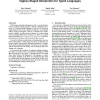Free Online Productivity Tools
i2Speak
i2Symbol
i2OCR
iTex2Img
iWeb2Print
iWeb2Shot
i2Type
iPdf2Split
iPdf2Merge
i2Bopomofo
i2Arabic
i2Style
i2Image
i2PDF
iLatex2Rtf
Sci2ools
114
click to vote
ICFP
2002
ACM
2002
ACM
Tagless staged interpreters for typed languages
Multi-stage programming languages provide a convenient notation for explicitly staging programs. Staging a definitional interpreter for a domain specific language is one way of deriving an implementation that is both readable and efficient. In an untyped setting, staging an interpreter "removes a complete layer of interpretive overhead", just like partial evaluation. In a typed setting however, Hindley-Milner type systems do not allow us to exploit typing information in the language being interpreted. In practice, this can mean a slowdown cost by a factor of three or more. Previously, both type specialization and tag elimination were applied to this problem. In this paper we propose an alternative approach, namely, expressing the definitional interpreter in a dependently typed programming language. We report on our experience with the issues that arise in writing such an interpreter and in designing such a language. To demonstrate the soundness of combining staging and depen...
Definitional Interpreter | ICFP 2002 | Multi-stage Programming Languages | Programming Languages | Type Language |
Related Content
| Added | 13 Dec 2009 |
| Updated | 13 Dec 2009 |
| Type | Conference |
| Year | 2002 |
| Where | ICFP |
| Authors | Emir Pasalic, Walid Taha, Tim Sheard |
Comments (0)

